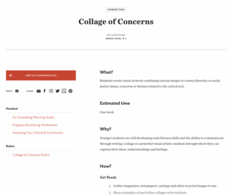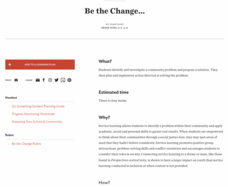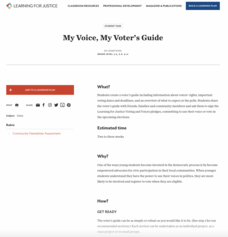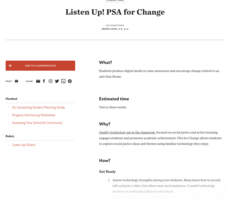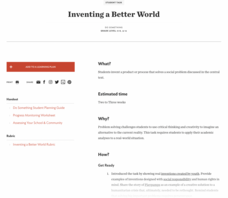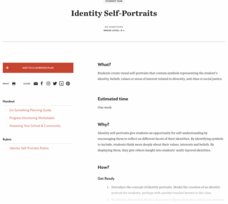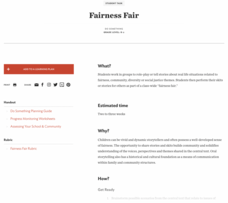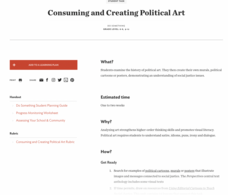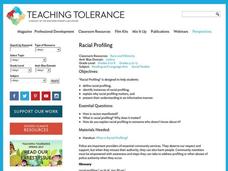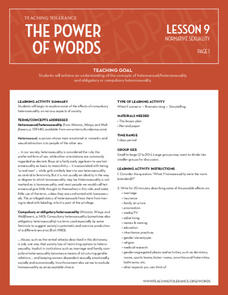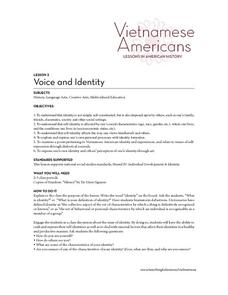Teaching Tolerance
Community Arts Showcase
An art showcase encourages class members to explore the themes of social justice and tolerance. They create an original artwork, engage in group discussions, and journal writing. The art gallery also provides a chance for families and...
Teaching Tolerance
Collage of Concerns
A picture can speak louder than words. An interesting lesson introduces the themes of social justice and diversity to young learners by having them create artwork. Scholars create collages from a variety of sources to showcase what...
Teaching Tolerance
Buddy Share
Here's a project that gives academics the chance to share their opinions on social justice with storytelling, creative writing, or art. Scholars choose what they want to create and are assigned buddies to support their efforts. To...
Teaching Tolerance
Be the Change...
An engaging lesson empowers individuals to make a difference in the community. Pupils work together to identify problems within the community and draft possible solutions. Scholars then take it to the next level by volunteering their...
Teaching Tolerance
Community Mural / Poster Campaign
Every piece matters. A creative lesson provides an opportunity for scholars to create murals or posters that represent their views on social justice. Academics work on smaller posters or pieces of a mural that will ultimately be...
Teaching Tolerance
Artistic Expression Showcase
No one is too young to create a masterpiece. Elementary artists delve into the topic of social justice with original artwork. Scholars keep journals to reflect on their experiences before putting paintbrush to paper. Final artwork is...
Teaching Tolerance
Act Up! Drama for Justice
A lesson turns young historians into playwrights to understand and speak out against social injustice. Pupils work individually or in groups to write and perform monologues that deliver personal messages on social justice. Writers then...
Teaching Tolerance
My Voice, My Voter's Guide
Class members may be too young to vote, but that doesn't mean their voices are silent! After researching key information, such as policies for registering to what to expect at the polls, young scholars create and present election guides...
Teaching Tolerance
Listen Up! PSA for Change
Challenge scholars to speak up about a topic by creating a public service announcement or social media blitz about an issue they feel passionate about. Have them research their issues, then decide the best way to take their messages to...
Teaching Tolerance
Inventing a Better World
From play pumps that provide clean water to shoes made from trash, innovators change the world one invention at a time. After researching various inventions, young entrepreneurs develop their own. Extension opportunities include prompts...
Teaching Tolerance
Identity Self-Portraits
What symbols represent you best? Individuals consider how they would draw peers using symbols about their identities with an interview and art activity. After conducting interviews and portraits, the art makes a great centerpiece for...
Teaching Tolerance
Identity Artifacts Museum
Who are you? It's a simple question, but younger learners have the opportunity to express their complex identities by making artifacts that represent parts of their identities. After engaging in the activity, they share who they are with...
Teaching Tolerance
Fairness Fair
How can we create a more fair world? Chances are, class members have some ideas! After reading a text about fairness, individuals create skits around the ideas of fairness. Extend the learning and make their presentations a...
Teaching Tolerance
Consuming and Creating Political Art
A picture is worth a thousand words, but political art may be worth even more! After examining examples of political cartoons, murals, and other forms of public art, class members create their own pieces to reflect their ideals and...
Teaching Tolerance
Community Spotlight Cards
Not all heroes wear capes—or cleats. Class members identify unsung heroes in their schools or towns for interviews, then create trading cards. A celebration including presentations or trading of cards completes their investigation of...
Teaching Tolerance
Musical Movement Showcase
Young performing artists create a song or choreograph a dance to illustrate a theme in a text they are reading. Step-by-step directions are included.
Teaching Tolerance
Changing Demographics: What Can We Do to Promote Respect?
America has always been seen as a melting pot to the world. Scholars research the concept of blending cultures in the United States and how it is changing over time. The final lesson of a four-part series analyzes the changing...
Teaching Tolerance
Civil Rights Activity Book
An activity booklet includes a timeline of the movement, a song, and various informational reading passages on leaders, events, and the Civil Rights Memorial in Washington DC. Reading response questions and word puzzles are sure to...
Teaching Tolerance
Racial Profiling
Racial Profiling. Class members chart what they know and what they want to know about this hot-button topic.
Teaching Tolerance
Reflection: What’s Your FRAME?
Encourage your class to recognize the diversity in the beliefs and backgrounds of their peers. Learners use the acronym FRAME to consider culture, background, and life experiences.
Teaching Tolerance
The Power of Words: Normative Sexuality
Learners collect newspaper articles which discuss societies who enforce heterosexuality. They brainstorm how heterosexuality is enforced in their community. They answer questions to end the instructional activity.
Teaching Tolerance
Vietnamese Americans: Voice and Identity
Students explore the concept that one's identity is imposed by others, such as one's family, friends, classmates, society, age, race, gender and socioeconomic status. They assess a poem pertaining to Vietnamese American identity and...
Teaching Tolerance
Human Rights
Students investigate the concept of human rights by focusing on the Vietnamese people. They conduct research about the South Vietnamese prisoners and how they have been treated during the conflict and in modern times. A research report...
Teaching Tolerance
The Power of Words: Ethnocentrism and Xenophobia
Students discover articles of current events dealing with the experiences of immigrants in the United States. They brainstorm words used to describe immigrants. They answer questions to end the lesson.



